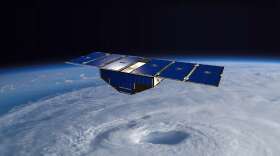-
A fleet of 8 toaster-oven sized satellites are heading to orbit with the task of seeing through rain. NASA’s Cyclone Global Navigation Satellite System will measure wind speeds in the tropics to better understand cyclones and hurricanes. And it does this in a pretty interesting way: using left-over GPS signals beamed down to earth.
-
A fleet of 8 toaster-oven sized satellites are heading to orbit with the task of seeing through rain. NASA’s Cyclone Global Navigation Satellite System will measure wind speeds in the tropics to better understand cyclones and hurricanes. And it does this in a pretty interesting way: using left-over GPS signals beamed down to earth.
-
Applications are now open for U.S. college experiments to hitch a free ride to space on an Atlas V rocket.
-
An experiment looking at the very beginnings of planetary formation is getting a ride on a sub-orbital rocket funded by NASA.
-
When it comes to experiments in space, scientists are thinking inside the box. CubeSats are self-contained laboratories about the size of a coffee thermos that hitch rides on rockets into low earth orbit. Despite their small size, CubeSats are providing valuable lessons to students and have the potential to open up space to more commercial ventures.
-
United Launch Alliance is making it easier – and cheaper – for universities to send miniature experiments to space. These micro-experiments, called CubeSats, are about the size of a box of tissue. And until now, they’ve had to find a bigger satellite to share a ride to space.
-
A new class of rockets is joining NASA’s commercial fleet. NASA will announce funding for rockets dedicated to launching tiny satellites called CubeSats.
Play Live Radio
Next Up:
0:00
0:00
Available On Air Stations






